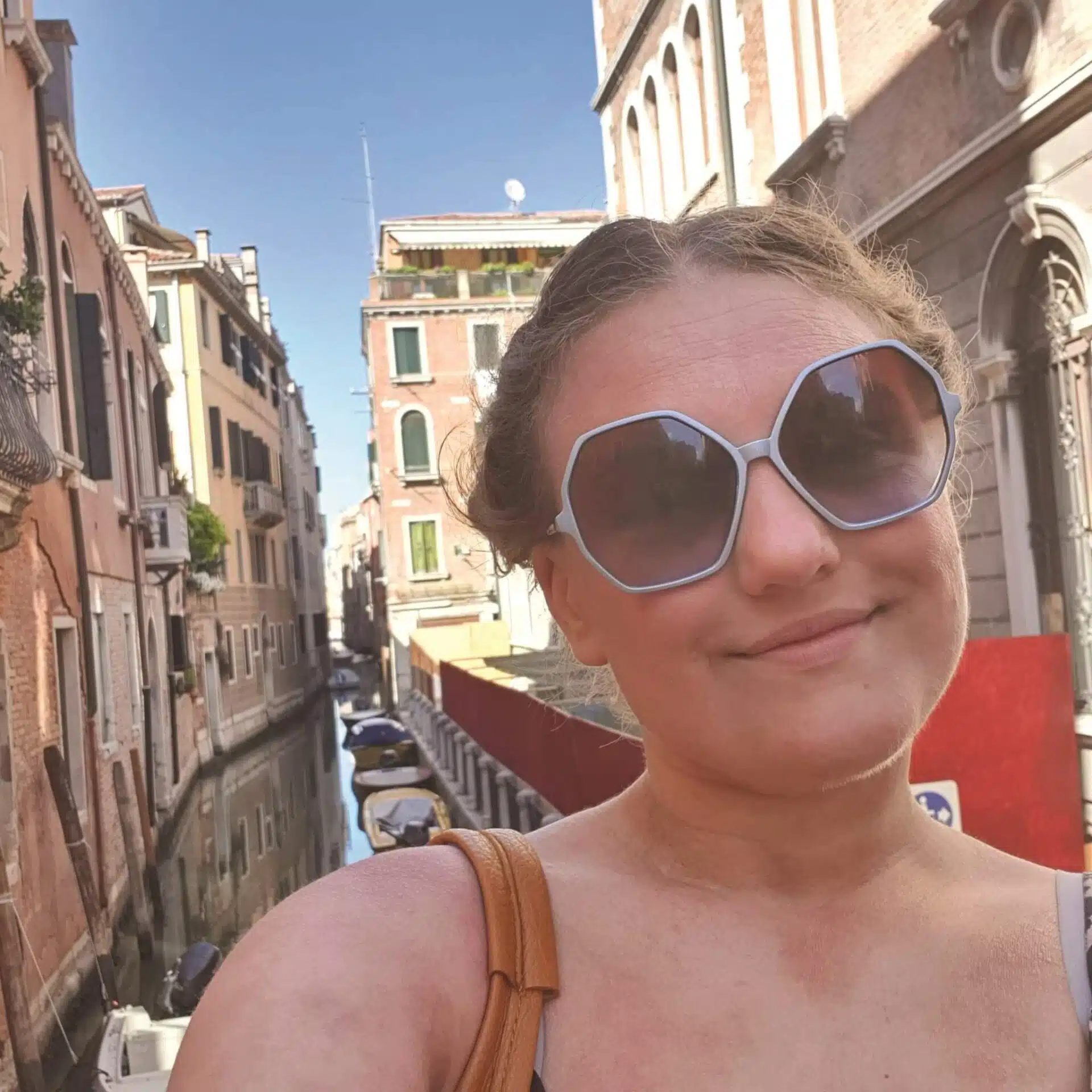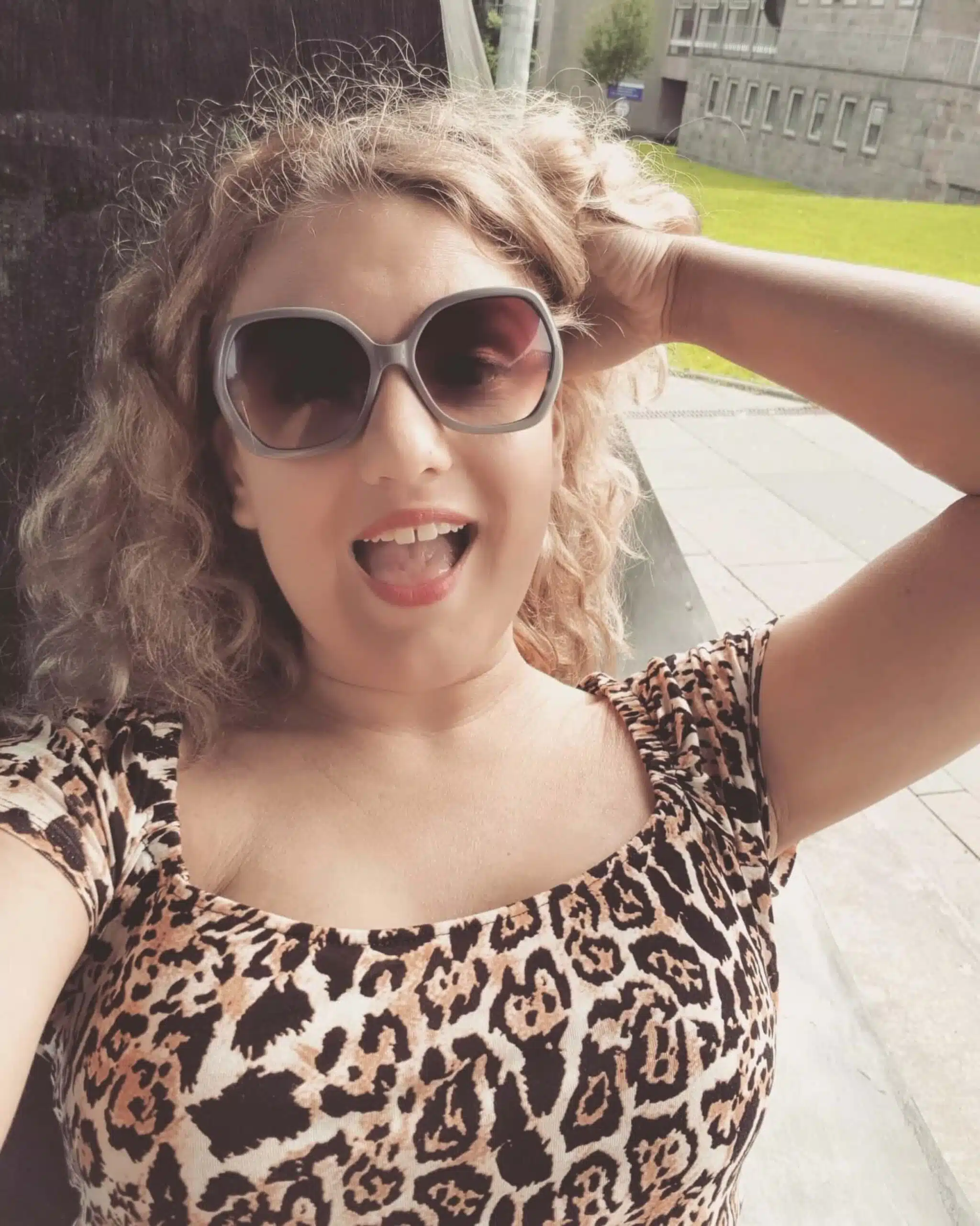Hannah (30) explains that chronic lifelong eczema is just one part of her story.
I’ve always known my limitations. That’s not me being negative – far from it. It just means I know that backpacking around remote parts of Africa isn’t compatible with my skin.
But eczema hasn’t stopped me from building an incredibly full, varied and enjoyable life, designed around its needs and mine. After all, there’s far more that I can do than I can’t, and eczema doesn’t define me as an individual.
First memory
Although I developed eczema at 18 months old, my first real memory is when I was five, when it suddenly took a major turn for the worse. I’d caught impetigo and was in a really bad state. When my mum and dad called the GP, they were told ‘Little kids make a big deal of nothing’ – even though, by this point, I was complaining of double vision.
Next day, I woke up and the entire right side of my body was an open wound. A GP home visit prompted a rapid transfer to the hospital, where I was placed in an isolation ward. My skin was weeping, so my pyjamas stuck to it. I was crying and screaming, but the nurses seemed too scared to help. My parents had to step in, until a nurse made of slightly sterner stuff came in a few days later and took charge.
It’s funny how children remember things differently. While I’m aware of all this, my abiding memories of the experience are that I got a TV all to myself (previously I’d had to share with my brother), everyone in my class sent me a card, and Santa visited and brought me a present!
False hope
Two years later, my eczema went into retreat, leaving me with dry, sensitive skin. It appeared that I’d ‘grown out of it’, as people said I would. However, aged 12, fuelled by puberty, it came back with a vengeance and hit me like a train. Wherever I had skin, I had eczema.
I understand why people want to give small children and parents hope that the condition will disappear as they get older – but for people like me, it sets you up for a huge fall when eczema sweeps back in again and takes over. It would be far kinder to offer a realistic assessment that it might go away, or it might go away for a time, only to come back later, or it might not go away at all.
Ultimately, it’s much easier to factor eczema into your life plans from the start, rather than having to make major changes to accommodate it later.
Not the best days of my life
I don’t know how I managed to go into school every day. I’d come home in tears, partly from the physical pain of horrendous eczema, but also because of what the other pupils had said.
I had a ‘granny walk’, as I couldn’t move properly due to the skin splitting. I couldn’t turn my neck, as the skin was so sore and tight. Classmates didn’t want to come close as they viewed my eczema as ‘gross’. I was literally a walking target. It wasn’t one person, either. It was bullying on a massive scale – even kids in other years got involved.
Worse still, I got into a painful cycle where my skin had a huge impact on my mental health, which then had a negative impact on my skin, which then led to a further deterioration in my mental wellbeing.
Safe spaces
I wasn’t completely alone, though. I had one friend in school and a couple outside of it. I’m still friends with all three. They’ve always seen eczema as just another part of me, and it was never an issue.
I was also a freakishly mature child and found it easy to befriend adults. I got on incredibly well with my piano and clarinet teachers and I found their lessons somewhere I could relax and have really good conversations. In truth, I never practised outside of lessons, but I always remember their rooms as safe spaces where I could be ‘me’.
At 14, I joined Amnesty International and was the youngest there by decades. Everyone was lovely, though, and this became another safe space where I was ‘Hannah’, not ‘Eczema Hannah’.
I know first hand how it feels to be isolated because of this incurable condition. That’s why I want to help make our organisation as accessible and as relevant as I can for the eczema community, so that nobody feels alone and unsupported and everyone feels represented.
Hannah
Game changers
I will always be grateful to the amazing dermatologist I met at this point, for really listening to me. On top of my emollients, topical steroids and antihistamines (to help me sleep), they prescribed phototherapy, which made a significant difference to my skin’s appearance and condition.
Crucially, they also referred me for cognitive behavioural therapy (CBT). It was supposed to help me with scratching but, once I met the psychologist and talked about the bullying and resulting panic attacks, they could see that I was suffering from anxiety and depression. The sessions made an enormous difference to my life, and suddenly I had a bit more confidence. I was still having a really tough time, but now I had tools to help me.
Mindful visualisations, relaxation techniques and mantras were accompanied by exercises. For example, before, I’d automatically think I was going to be a target because of my skin. These techniques helped me reprogramme that thought process and see that this didn’t have to be the outcome. I also learned tapping techniques to help turn off my stress response, which also helped me to feel in control. My life was literally transformed by these two specialists.
A whole new world
One of the best decisions I’ve ever made was to take a gap year between school and university. It gave my confidence another huge boost and really helped with the transition between the two. I took French classes, learnt to sew, pursued my love of creative writing and spent one month in Brussels and another in Germany – with a suitcase crammed full of creams in tow!
Because of my experience at school, I headed off to university thinking I wouldn’t make friends, so it was a surprise to me when I did. Although my eczema made my life very different to that of other students (especially the associated admin, like having to plan everything in advance and going home in between lectures to apply cream), they just accepted it, and me.
I was recently a bridesmaid for one of my university friends, and it meant the world when she went to great lengths to source ‘team bride’ pyjamas and dressing gowns in 100% cotton – which are almost impossible to find – not just for me, but for everyone. She did it without even mentioning it to me, because she knew I wouldn’t be able to wear synthetic ones, and she wanted us all to have the same.
Never looked back

Since graduating, I’ve had good skin years and bad, but I’ve never gone back to the dark place I was in at school. I’ve moved around a lot, including abroad with work – which saw me based for six months in Washington DC – which has caused problems with continuity of care and health record transfers.
Eczema has shaped my career. I knew I’d never be able to take a field-based role and always accepted I’d be in an office in a city. I’ve loved every job I’ve had, though, and am still able to work in an area I’m passionate about.
Luckily, I’ve always had supportive employers, and working from home since Covid has been amazing. I can put on cream whenever I want, in comfort, without having to lock myself in an office toilet for an hour.
Giving back
Last year I became a trustee of National Eczema Society. My mum and my aunt – who also has severe eczema – have been members of the society for years, and it’s a cause I really believe in.
I know first hand how it feels to be isolated because of this incurable condition. That’s why I want to help make our organisation as accessible and as relevant as I can for the eczema community, so that nobody feels alone and unsupported and everyone feels represented.

